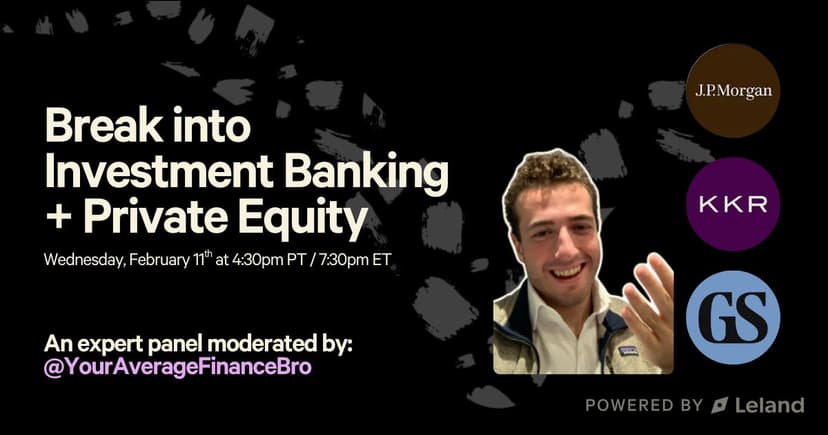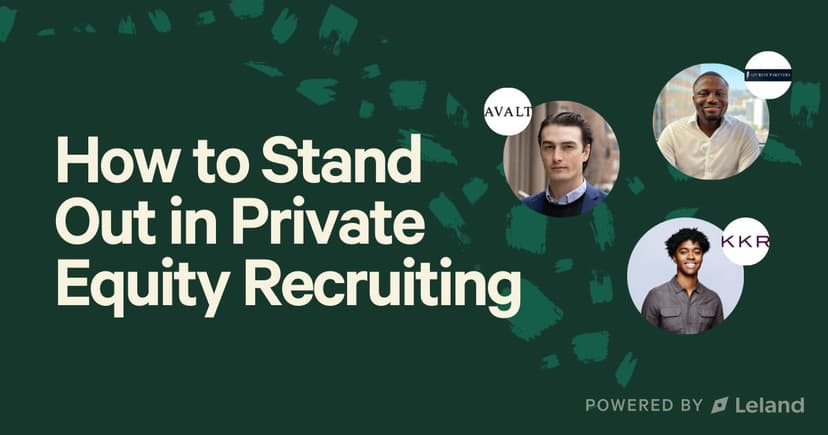Why Private Equity? Ex-PE VP on How to Answer + Expert Tips
Get expert-backed tips on how to answer “Why private equity?” with clarity and confidence—plus real examples from an ex-PE VP who’s seen it all.
Posted August 10, 2025

Join a free event
Learn from top coaches and industry experts in live, interactive sessions you can join for free.
Table of Contents
Answering the “Why private equity?” question can make or break your interview, yet it’s one of the most misunderstood prompts in the recruiting process. Too many candidates default to generic answers about working with smart people, learning, or loving finance. That might get you past the first screen, but it won’t win you an offer from a top private equity firm.
This guide breaks down what a strong answer looks like, based on insights from a former private equity VP who’s interviewed and hired dozens of candidates. You’ll get tactical advice tailored to your background, examples of what to say (and what to avoid), and a proven framework to help you communicate with credibility and investor-level confidence.
Read: How Does Private Equity Work? A Complete Beginner’s Guide to the PE Industry
Why Interviewers Ask “Why Private Equity”
When a private equity firm asks, “Why private equity?” they’re not just making conversation. This question is a proxy for long-term motivation, maturity, and investor mindset—and it often predicts whether you’ll succeed across the private equity lifecycle.
Unlike investment banks or consulting firms, private equity funds invest capital with multi-year time horizons and rely on lean deal teams. They want candidates who grasp the difference between public markets and private capital, who understand private equity investments are about ownership, operational improvements, and long-term value creation.
Why it matters: Candidates who ace this question demonstrate a clear investor perspective and a deep understanding of private equity strategies, which translates into better performance on the job.
Read: Private Equity Interviews: The Ultimate Guide
What Makes a Strong Answer to “Why Private Equity?”
An exceptional “Why private equity?” answer proves that you understand the role better than most analysts do on day one. It’s not about sounding smart—it’s about showing you’ve internalized what the job actually entails and why you’re a fit.
Most candidates fall flat because they answer like outsiders. They say:
- “I like working with smart people.”
- “I want to learn.”
- “I’m interested in finance.”
Those are outcomes, not motivations—and frankly, they could apply to investment banks, hedge funds, or even consulting firms. PE professionals see right through it.
A strong answer, on the other hand, shows that you:
- Know how private equity firms source, evaluate, and grow portfolio companies
- Want to take ownership over the full investment lifecycle—from the due diligence process to the exit
- Understand the value creation levers PE funds use to improve private companies
3 Core Components Every Strong “Why PE” Answer Must Include:
| Component | What It Means | Example |
|---|---|---|
| Personal Spark | What initially drew you in | “I got exposed to PE during a B-school internship where I helped a fund evaluate an acquisition. I was hooked by how hands-on and analytical the work was.” |
| Professional Fit | Why your background aligns | “In investment banking, I built the LBO model and drove diligence for a software deal. Now I want to move from advisor to owner.” |
| Investor Perspective | What do you like about the actual work | “I love the challenge of identifying hidden upside, partnering with founders, and driving sustainable cash flows, not just winning a deal, but growing it.” |
How Long Should Your Answer Be?
Your live interview answer should be 60–90 seconds, tops.
Here’s a winning example under 80 seconds:
“I first became interested in private equity during my internship at [Firm], where I helped evaluate a niche industrials target. I enjoyed building the investment thesis and understanding how the fund would drive value through pricing strategy and bolt-on acquisitions. Since then, I’ve worked in investment banking, leading diligence for tech M&A deals and building LBO models. But I want to go beyond advising—I’m excited about owning outcomes, partnering with management, and helping companies scale post-close. PE is where I can apply my skill set and grow into a long-term investor.”
This answer works because it:
- Highlights relevant deal experience
- Shows real understanding of private equity strategies
- Speaks to the why behind the transition
- Is clean, confident, and rooted in firsthand exposure
Pro tip from an Ex-PE VP: “If your answer could also work for someone applying to a venture capital, hedge fund, or mutual fund role, it’s too generic. Tailor it to show you want to own, build, and exit businesses, not just analyze them.”
Answering The “Why Not” Questions & Follow-ups
Top private equity firms want to see that you’ve ruled out other paths for the right reasons. These follow-up questions test your self-awareness, investor mindset, and understanding of the private equity industry relative to other alternative investment funds.
Expect to be asked:
- Why not hedge funds or venture capital firms?
- Why not long-term investment banking?
- Why not join a publicly traded company or stay in corporate?
Your answers to these “Why nots” are just as revealing as your original pitch. The best responses don’t bash other paths; they frame private equity as the best alignment for your skills, interests, and long-term goals.
How to Handle the “Why Not” Follow-Ups Like an Expert
Why not Venture Capital?
What they’re testing: Whether you understand the difference in company maturity, return timelines, and involvement.
How to answer: “I admire what venture capital firms do, but I’m more drawn to the complexity and structure of later-stage investing. I’m excited by the challenge of improving mature companies through strategic initiatives, leveraging debt financing, and partnering with management teams to drive measurable performance—not just providing early capital, but guiding execution.”
Why not Hedge Funds?
What they’re testing: Whether you’re defaulting to PE because it’s “buy side,” or if you understand the fundamental difference in approach.
How to answer: “I’m drawn to long-term ownership and the operational side of investing. While hedge funds focus on trading public assets and arbitrage information, I want to partner with private companies, lead the due diligence process, and support long-term transformations across the full investment fund lifecycle.”
Why not stay in Investment Banking?
What they’re testing: Whether you’re running from banking or running toward investing.
How to answer: “Banking has been invaluable for building technical skills and exposure to leveraged buyouts, but I want to move beyond advising and into execution and ownership. In private equity, I can carry deals from sourcing to exit, contribute to operational improvements, and take accountability for outcomes.”
Why not join a Publicly Traded Company or stay in Corporate?
What they’re testing: Do you understand the trade-offs between operating roles and investing?
How to answer: “While I’ve learned a lot in corporate, I’m more energized by evaluating a range of opportunities and driving strategy across multiple businesses. I’m excited by the challenge of helping private equity fund managers scale companies and generate returns across sectors—not just optimize one business unit.”
Pro Tip from a PE Interviewer: “The best candidates don’t just say ‘PE is better than XYZ.’ They say: ‘This is why I’m a better fit for private equity.’ That shift in mindset shows maturity, and we notice it.”
A 3-Part Framework on How to Structure Your Answer
A great “Why private equity?” answer doesn’t start with prestige or jargon—it starts with clarity. The best responses come from candidates who’ve connected the dots between their motivation, background, and investment mindset.
This 3-part framework is used by top private equity professionals, from growth equity associates to partners at leading PE firms, to assess fit. Use it to build an answer that’s compelling, credible, and investment-grade.
1. Personal Spark — What First Drew You to Private Equity
This is your hook. The goal is to show that your interest didn’t start last week—it’s rooted in real exposure or intellectual curiosity. Think about when private equity first felt like more than just a buzzword.
Real prompts to reflect on:
- “During my M&A internship at Evercore, I helped a mid-market PE firm diligence a tech asset. I was fascinated not just by the deal but by how they thought through growth strategy and management incentives.”
- “I first became interested in private equity after participating in an LBO case competition, where we built a thesis around margin expansion and multiple arbitrage. I realized I wanted to work in a role that combines analysis with business-building.”
- “As a startup founder, I had several conversations with growth equity investors. I was struck by how deeply they understood our business, not just financially, but operationally. I wanted to develop that same lens.”
2. Professional Fit — Why Your Experience Aligns with the Role
This is where you demonstrate that you’re ready to do the job. Whether you’re coming from investment banking, consulting, corporate strategy, or elsewhere, highlight how your current work mirrors what private equity firms do: sourcing, diligence, and driving outcomes.
Real prompts to build from:
- “In my time at Morgan Stanley, I led diligence workstreams on a $500M logistics carve-out. I built the LBO model, pressure-tested assumptions, and collaborated directly with the sponsor’s deal team. It made me want to be on the ownership side.”
- “At Bain, I worked with a PE-owned industrial company on a 100-day plan post-acquisition. I helped the management team identify new pricing strategies, and I loved being close to operational decisions with real equity value at stake.”
- “At Google, I supported corp dev in evaluating early-stage acquisitions. I developed market models, interviewed target leadership, and presented findings to senior leadership, giving me firsthand exposure to buy-side decision-making.”
3. Investor Perspective — What You Love About the Actual Work
This is where you prove you think like an investor. You’re not just chasing deals—you’re motivated by the complexity and challenge of improving private companies over time.
Real prompts to use:
- “What I love most about private equity is the ability to take ownership over the full lifecycle of a deal, from building the investment thesis to driving operational improvements post-close. I’m drawn to the accountability and strategic decision-making involved.”
- “I enjoy the challenge of identifying underperforming businesses with strong fundamentals, partnering with management to execute a turnaround, and seeing the results reflected in real cash flows and long-term fund performance.”
- “PE offers the rare opportunity to apply both analytical and strategic thinking to real businesses. The chance to help grow a company, develop a value creation plan, and ultimately deliver strong returns to equity investors is what excites me.”
Common Mistakes Candidates Make (And How to Do Better)
Even top-performing candidates from investment banks, consulting firms, or elite MBA programs routinely stumble on the “Why private equity?” question. Not because they aren’t capable—but because they fail to communicate in the language of private equity professionals.
Below are the three most common mistakes PE interviewers hear again and again—and how to fix them with clarity, precision, and investor fluency.
Mistake #1: Making it all about prestige or learning
Saying “I want to learn” or “I want to be around smart people” may sound humble or driven, but it comes off as superficial and unfocused. Every career path, like venture capital, hedge funds, and even mutual funds, offers learning opportunities. And being “around smart people” is hardly unique to private equity funds.
Instead, demonstrate what you can contribute and what excites you about the investment strategies and ownership model PE offers.
Example: “I’m excited to apply my diligence and modeling skills in a role where I can take ownership over outcomes such as identifying upside, partnering with operators, and helping scale a business over the investment horizon.”
Mistake #2: Giving a generic answer
The fastest way to get passed over is by giving an answer that sounds like it could apply to any buy-side job. Interviewers can spot a generic pitch from a mile away.
Example: “I like finance, I want to do deals, and private equity seems like a good fit.”
This doesn’t show any understanding of how private equity fund managers think, operate, or deliver returns.
Do this instead: “I’m drawn to the full lifecycle of private equity deals—building a thesis, conducting deep due diligence, and supporting long-term operational improvements. I want to be in a role where I can apply both financial rigor and strategic thinking to grow real businesses.”
Mistake #3: Not showing investor mindset
Many candidates never mention what the job of a private equity associate or investment professional actually entails. They talk about the prestige, the firm, or their background—but not the work itself.
This signals to interviewers that you may not be ready for the role, even if your resume says otherwise.
Do this instead: Mention key elements of the job: sourcing, evaluating private equity investments, building models, drafting IC memos, managing relationships with company management, and tracking portfolio company performance post-close.
Weak vs. Strong Answers
| Weak Answer | Why It Falls Flat | Strong Answer | Why It Works |
|---|---|---|---|
| “I want to learn from smart people.” | Generic, non-specific—could apply to any job | “I want to take ownership over equity investments and help drive fund performance through hands-on operating work.” | Shows understanding of ownership and accountability |
| “I like finance and want to do deals.” | Vague and transactional | “I’m excited about identifying undervalued private companies, working with leadership, and building value over a multi-year horizon.” | Focuses on value creation, not just transactions |
| “PE is prestigious and selective.” | Signals ego and a surface-level understanding | “Private equity offers the chance to work deeply with businesses, shape strategy, and generate long-term value for limited partners.” | Shows depth, maturity, and alignment with the job |
How to Answer Based on Your Background
A strong “Why private equity?” answer doesn’t look the same for everyone—nor should it. Great PE interviewers don’t expect cookie-cutter responses. They expect candidates to tie their experiences to the actual responsibilities of a private equity professional: sourcing deals, performing due diligence, collaborating with company management, and driving equity investment outcomes over time.
Below are tailored examples for common candidate backgrounds, each followed by expert commentary from real interviewers who’ve hired at top private equity firms.
Investment Banking → Private Equity
Sample answer: “At Morgan Stanley, I helped lead the LBO model and due diligence for a sponsor-backed carve-out in the healthcare space. I loved the analytical rigor, but I realized I wanted to stay with the business beyond the transaction. What excites me about private equity is the opportunity to take ownership across the deal lifecycle—partnering with management to drive operational improvements and create lasting value for limited partners.”
What works:
- Demonstrates deal fluency and direct exposure to private equity transactions
- Emphasizes desire to go beyond advising and into ownership
- Uses accurate terms like “LBO,” “carve-out,” “deal lifecycle”
Interviewer Feedback (Ex-Principal, Mid-Market PE Fund): “This is what we want to hear from banking analysts—someone who isn’t just chasing prestige, but who understands the shift from advisor to investor. Bonus points for naming specifics like the sector and deal type.”
Read: PE vs. IB: What’s the Difference and Which Is Right for You?
Consulting → Private Equity
Sample answer: “At Bain, I worked with a PE-backed industrials company on a post-acquisition 100-day plan, focused on cost takeout and margin expansion. That experience showed me how investors create value beyond the deal itself. I’m excited by the idea of owning decisions, working across a portfolio, and being accountable for long-term performance.”
What works:
- Clearly articulates operational experience relevant to PE
- Connects consulting experience to investor responsibilities
- Understands value creation post-close
Interviewer Feedback (Operating Partner, Growth Equity Firm): “Consultants need to show they’re not just deck-builders but also problem solvers who can think like owners. This answer nails that and shows readiness for the switch.”
Corporate → Private Equity
Sample answer: “At Amazon, I led pricing strategy initiatives that increased revenue in our B2B division by 15%. I saw firsthand how small changes in operations can drive outsized impact. That lens is what I want to bring to private equity—identifying growth levers and supporting portfolio companies in scaling effectively.”
What works:
- Highlights operator perspective and data-backed outcomes
- Translates corporate experience into an investment mindset
- Strong use of real impact metrics
Interviewer Feedback (Senior Associate, Tech PE Fund): “Too many corporate candidates focus on job titles. This one focuses on outcomes. We want people who’ve seen how businesses actually run and who can bring that perspective to a boardroom.”
Undergrad or MBA → Private Equity
Sample answer: “During my MBA, I interned at a growth equity firm where I helped source and evaluate a Series B investment in a B2B SaaS company. I contributed to the market sizing and worked on the investment committee memo. That experience solidified my desire to work in private equity—where I can blend analysis with long-term thinking to help private companies grow.”
What works:
- Uses concrete internship experience and technical exposure
- Mentions sourcing and memo writing—key entry-level responsibilities
- Shows mature understanding of PE’s blend of strategy and finance
Interviewer Feedback (Director, Generalist PE Fund): “We know MBAs don’t have years of deal experience, but this answer shows they’ve seen the process end-to-end. That’s a huge signal that they’re ready to contribute.”
Non-Traditional Background → Private Equity
Sample answer: “As a startup founder, I raised capital from venture capital firms and eventually exited the business to a strategic acquirer. That experience gave me firsthand insight into what makes a business fundable and how to scale sustainably. I’m interested in private equity because I want to apply that perspective across industries, helping founders and CEOs improve performance while delivering strong returns to equity investors.”
What works:
- Highlights founder experience as an asset, not a liability
- Emphasizes pattern recognition and value creation skills
- Uses language that PE firms respect: “fundable,” “performance,” “returns”
Interviewer Feedback (Partner, Lower Middle Market Fund): “Founders are often underrated candidates. This kind of response shows humility, depth, and a real appreciation for the investor mindset. I’d move this person forward.”
A Guide for Transitioning Professionals From IB, Consulting, or Non-Trad Roles
Private equity firms don’t just hire one archetype anymore. While traditional backgrounds like investment banking and consulting still dominate, firms increasingly value candidates with diverse experiences, especially those who understand how to think like investors, not just advisors or operators. The key is to map your skills to the core competencies of the role: deal execution, operational value creation, strategic insight, and ownership mentality.
From Investment Banking to Private Equity
If you’re coming from investment banking, your challenge is strategic. PE firms already assume you can build a bulletproof LBO model and handle long hours. What they want to see is that you understand the shift from advisor to principal. Focus on your desire to take ownership over deals, influence decision-making beyond the transaction, and work with company management to drive long-term outcomes. Speak to your experience with debt financing, structuring private equity deals, and managing the due diligence process, but also clarify why you're excited to play the role of an investor who carries that deal through to value creation and exit.
From Consulting to Private Equity
As a consultant, your strength lies in strategic thinking and operational insight, but you'll need to prove you can apply those skills in a transactional, investment-focused context. Emphasize how your experience advising portfolio companies or working on post-acquisition value creation directly aligns with what private equity fund managers look for in new hires. Firms want to know that you understand how to identify value levers, improve performance metrics, and think like an owner, not just a strategist. Bring up examples of working on commercial due diligence, 100-day plans, or cost transformation initiatives, and tie those to the goals of long-term equity investors.
From Corporate or Operating Roles to Private Equity
Corporate professionals and operators offer a unique advantage: firsthand experience with execution and scaling. If you’ve worked inside a company’s finance, strategy, or product teams, frame that experience as proof that you understand what drives performance from the inside out. Highlight your ability to interpret KPIs, manage P&Ls, and partner cross-functionally to improve cash flows or margins. Private equity firms are increasingly valuing candidates who can step in and help evaluate or guide portfolio companies, especially in operationally intensive verticals like healthcare, logistics, or SaaS. Make sure to also demonstrate your financial fluency and comfort navigating deal environments.
From Non-Traditional Backgrounds to Private Equity
Non-traditional backgrounds, such as founders, engineers, asset managers, and analysts from alternative investment funds, can break into private equity by showcasing differentiated insight and commercial instincts. If you’ve founded a company, worked in venture capital, or advised institutional clients, lean into your ability to evaluate business models, influence decision-making, and manage risk. Private equity is ultimately about judgment: identifying companies with potential, knowing when to act, and guiding existing businesses toward better outcomes. Frame your story around the value you bring, whether it’s deep technical expertise, entrepreneurial grit, or experience navigating complex financial instruments. Fluency in the language of investing—terms like exit strategy, operational improvements, and fund performance—will signal readiness.
Expert Tips From an Ex-PE VP to a Future PE Professional
Private equity interviews don’t reward perfection. They reward clarity, judgment, and the ability to speak like someone who belongs on the deal team. According to a former Vice President at a $15B+ middle-market private equity fund, the candidates who stand out understand what private equity professionals actually do and can communicate their thinking with credibility and conviction.
Below are three tactical tips he shared for candidates preparing to enter the room with principals, partners, or senior associates.
1. Show That You Understand the Job—Without Needing to Have Done It
You don’t need to have been on the buy-side to sound like someone who could thrive there. What senior professionals are really listening for is evidence that you understand the deal lifecycle, from sourcing to execution to exit, and that you can think critically about what creates value over time.
That doesn’t mean listing buzzwords. It means understanding what they mean in context.
Use language that signals deal fluency:
- Value creation → Refers to how PE firms improve a business post-acquisition (e.g., margin expansion, pricing, M&A)
- Exit optionality → Demonstrates awareness that a good deal isn’t just about entry multiple; it’s about preserving multiple paths to monetize
- Alignment → A core concept in private equity, showing you understand the importance of incentive structures between investors, management, and LPs
When you use these terms correctly and in context, it communicates that you’ve done your homework—and more importantly, that you think like an investor.
2. Rehearse to Be Ready, Not Robotic
One of the biggest turnoffs in PE interviews? Candidates who sound like they memorized a script. Great interviewers can spot over-rehearsed answers instantly—and it often signals insecurity or lack of real conviction.
The solution isn’t to wing it. It’s to internalize your story, not memorize it. Prepare your “Why PE?” answer, technical walk-throughs, and deal discussions with depth, but speak them aloud in your own words until they feel conversational. Great candidates sound polished, but not polished at the expense of authenticity.
If you’re using frameworks (e.g., the 3-part “Why PE” structure), internalize the logic, but vary the delivery. Be prepared to pivot based on how the conversation flows—just like you would in a live deal discussion.
3. Focus on Thought Process Over Perfection
Private equity firms aren’t looking for candidates who know everything. They’re looking for people who ask smart questions, challenge assumptions, and take a structured approach to decision-making. Whether you’re analyzing a potential private equity investment, walking through an LBO model, or responding to a case prompt, focus on how you think—not just what you know.
If you don’t know an answer, own it and walk through how you’d figure it out. That mindset matters far more than checking every technical box.
Quote: “I never hired a candidate because they were the smartest person in the room. I hired people who asked sharp questions, showed clear thinking under pressure, and understood what our job really is: to create value by making better decisions than the market. If you can speak to how businesses grow, how risk is managed, and how incentives drive outcomes, you’re already ahead of most candidates.” — Former Vice President, $15B Private Equity Fund
Need More Expert Tips on Your PE Interview?
Top private equity coaches have interviewed at top PE funds, worked on $1B+ leveraged buyouts, and helped hundreds of candidates land offers. Get personalized support for crafting your “Why PE?” answer, perfecting your resume and stories, and navigating interviews with fund managers and partners. Browse PE coaches here.
You can also explore private equity bootcamps and free events to unlock your full PE potential!
See: The 10 Best Private Equity Career Coaches for Interview Prep & Training
Read these next:
- Top Skills You Need to Break Into Private Equity
- 50+ Most Common PE Interview Questions & Answers (Behavioral/Technical)
- How to Ace Your Blackstone Interview
- The 10 Best Questions to Ask Your Interviewer in a Private Equity Interview
- Finance Internships for College & High School Students
- The Best Venture Capital & Private Equity Newsletters and Podcasts
FAQs
What’s a good reason for wanting to work in private equity?
- A strong reason includes a passion for improving businesses, ownership over outcomes, and a desire to make long-term equity investments that drive real change.
What’s the best way to prepare for the “Why private equity?” question?
- Use the 3-part framework (personal, professional, investor), rehearse 60–90 second answers, and get feedback from private equity professionals or coaches.
How does “Why PE?” differ from “Why investment banking?”
- “Why IB” is about learning fast, building skills, and advising. “Why PE” is about ownership, long-term asset management, and value creation in private market asset classes.
What’s a concise example of a good “Why private equity?” answer?
- “I want to take ownership of equity investments, partner with company management, and apply my strategy and modeling background to drive long-term value.”
Browse hundreds of expert coaches
Leland coaches have helped thousands of people achieve their goals. A dedicated mentor can make all the difference.




















